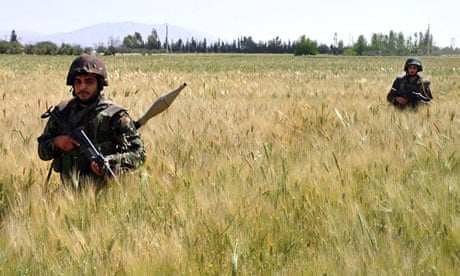Syrian troops have taken control of a town near the main road linking the capital, Damascus, with Jordan, an advance in the regime's campaign to drive rebels from the south, an activist group has said.
Rebels seeking to topple President Bashar al-Assad are trying to carve a pathway from the Jordanian border through the southern province of Deraa in what is seen as their best chance of capturing Damascus.
A few weeks ago they scored significant gains but suffered setbacks after the regime launched a counteroffensive.
In recent days, regime troops and rebel fighters have battled over Khirbet Ghazaleh. Regime forces retook the town near the Damascus-Jordan road on Sunday and rebels withdrew from the area, said Rami Abdul-Rahman, the head of the Britain-based Syrian Observatory for Human Rights.
Troops reopened the road, restoring the supply line between Damascus and Deraa city, the contested provincial capital, he said. Regime forces were carrying out raids and searching homes in Khirbet Ghazaleh on Monday.
Damascus, still overwhelmingly under regime control, is the ultimate prize in a largely deadlocked civil war. Rebels control large parts of the countryside in northern Syria, but those areas are further away from the capital than the Jordanian border.
Arab officials and western military experts have said Middle Eastern powers opposed to Assad have stepped up weapons supplies to Syrian rebels, with Jordan opening up as a new route.
The uprising against Assad erupted in March 2011 and escalated into a civil war. Over the weekend, the Observatory issued an estimated death toll of more than 80,000, with almost half of them civilians. In February, the UN said at least 70,000 Syrians had been killed.
Western leaders face growing pressure to find a way to end the conflict – because of the rising death toll and fears that neighbouring Israel or Turkey could inadvertently get pulled deeper into it.
Turkey has blamed the Assad regime for twin car bombs on Saturday that killed 46 people and wounded scores in a border town that serves as a hub for Syrian refugees and rebels.
Turkey said it would not be dragged into the quagmire but tensions between the former allies run high.
This month Israel launched back-to-back air strikes in Syria against what it said were shipments of advanced Iranian missiles. Israeli officials signalled there would be more attacks unless its neighbour refrained from trying to deliver such "game-changing" missiles to its ally Hezbollah, an anti-Israel militia in Lebanon.
For now, the west is placing its hopes on a diplomatic plan that previously ran aground but now appears to have stronger Russian backing.
Last week the US and Russia agreed to revive the idea of negotiations between Syria's political opposition and members of the regime on a transitional government, accompanied by an open-ended ceasefire.
